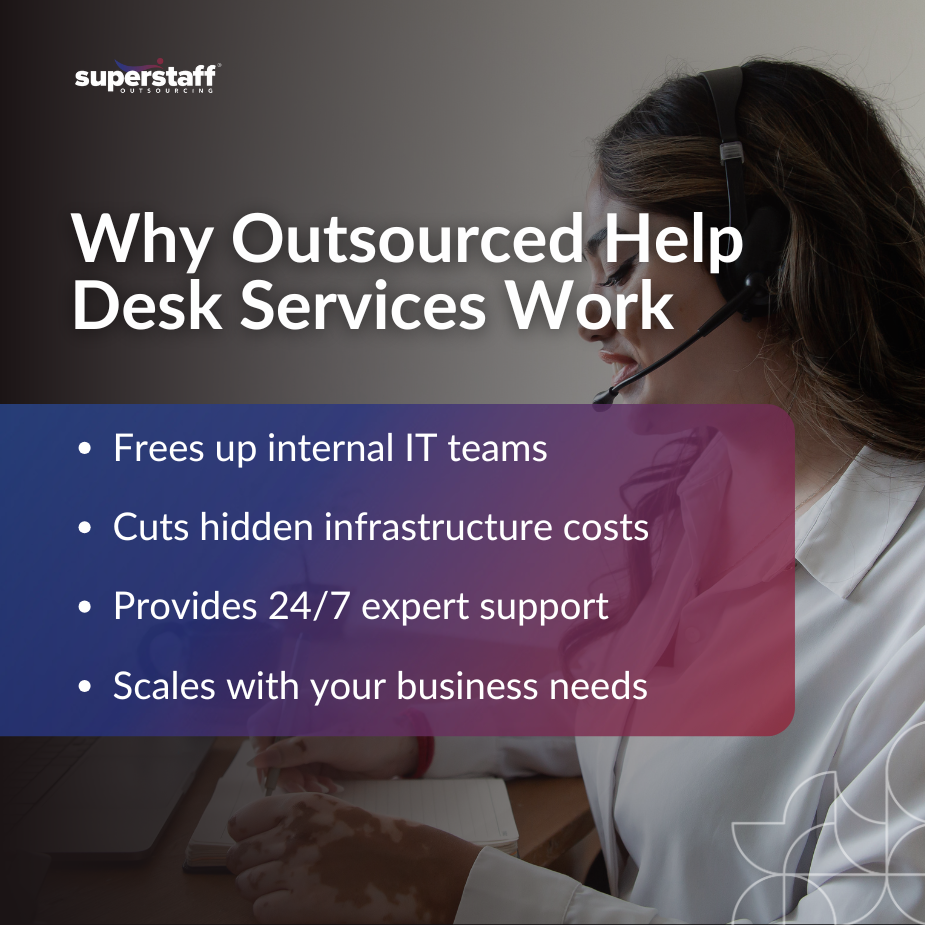
Most businesses assume keeping their IT help desk in-house saves money. At first glance, it might look that way—however, the hidden costs quickly start to stack up. For example, constant interruptions and growing ticket backlogs often make it difficult for internal support teams to keep pace without draining company resources.
The reality is that many in-house IT help desks are underfunded, understaffed, and overburdened. They can’t provide the speed, consistency, or scale that modern businesses require. In this blog, we’ll break down the real cost of internal IT support and explain why outsourced help desk services are emerging as a strategic advantage for growth-focused companies. By the end, you’ll have a clearer picture of how outsourcing can not only reduce expenses but also drive efficiency and performance.
Your Internal IT Team Is Stretched Too Thin to Keep Up
In most small to mid-sized businesses, the IT team wears too many hats. One minute they’re resetting passwords, the next they’re trying to roll out a new software platform across departments. It’s a dangerous juggling act—and one that’s quietly costing you innovation.
When technical experts are pulled away from critical projects to troubleshoot printers or fix minor network glitches, their impact is diluted. More importantly, what you’re really losing isn’t just time, but opportunity. As a result, projects stall, security updates fall behind, and strategic goals take a backseat to never-ending support tickets.
Eventually, frustration builds, both within the IT team and across the broader organization. Burnout becomes real, morale dips, and your top tech talent starts eyeing the exit.
By handling Level 1 and Level 2 requests, third-party help desk providers relieve pressure on your internal team. This frees your internal team to focus on the big-picture items that actually move the business forward.
The Total Cost of an In-House Help Desk Goes Beyond Salaries

It’s easy to look at a help desk team and tally their monthly salaries. What’s harder to see are the hidden costs lurking beneath the surface. Equipment, software licenses, training programs, even the office space required to house your team—all of it adds up fast.
And then there’s the cost of time. Every minute a ticket sits unresolved slows down the people waiting on it. Productivity takes a hit. Departments miss deadlines. Clients wait longer for deliverables. These delays may not show up on a budget sheet, but they eat away at performance and profitability.
Outsourced help desk services shift these costs into a scalable model. You no longer have to invest in training, certification renewals, or maintaining a growing IT team. Instead, you gain a flexible service contract that adjusts with your needs. The cost becomes predictable—and often far lower than managing everything in-house.
Outsourcing Gives You Access to 24/7 Expert Support—Without Overtime Pay
In today’s always-on business environment, downtime is unacceptable. But building a 24/7 in-house help desk is expensive, especially if you’re dealing with shifts, night differentials, or overtime pay. Most midmarket companies simply can’t afford that kind of round-the-clock coverage.
This is where outsourced help desk services make a major difference. Providers typically operate across global time zones, allowing them to offer seamless, always-available support. Whether your employees are in New York, Manila, or Madrid, someone’s there to help—instantly.
And it’s not just about availability. Outsourced teams are trained for quick resolution. They follow structured workflows that get users back online faster, which leads to better productivity across the board. Employees no longer have to wait until “business hours” for help. The support is already there, working quietly behind the scenes.
Outsourced Help Desks Follow Proven Processes and SLAs
One of the most overlooked benefits of outsourcing is the level of discipline it introduces to your support environment. Internal teams may vary in how they handle tickets, especially under stress. But outsourced help desk services operate under clear service level agreements (SLAs) and documented processes.
This means every support request is handled consistently, tracked meticulously, and resolved within a promised timeframe. From detailed knowledge bases to intelligent triage systems, everything runs like clockwork.
Not only does this improve issue resolution, but it also gives leadership valuable insights into performance. You can measure ticket volume, first-contact resolution rates, and user satisfaction—all of which are critical to maintaining high operational standards. This kind of visibility is rare in traditional in-house environments, especially when tracking is done manually or inconsistently.
Outsourcing Scales With Your Business—Without the Hiring Headache
Growth is exciting, but it also creates challenges. As your workforce expands, so do IT support demands. If your help desk is internal, that means recruiting, onboarding, and training every time your headcount climbs. It’s a time-consuming process that often lags behind business needs.
Outsourced help desk services eliminate this friction. Need to add support for a new department? Scale up. Experiencing seasonal slowdowns? Scale down. No hiring. No layoffs. No disruption.
Top providers offer multi-tiered support teams that adjust to your workload. Whether you need basic ticket handling or advanced troubleshooting, there’s a team ready to step in. You pay for what you need—no more, no less. And because the provider handles recruitment and training, your internal HR and IT teams stay focused on strategic goals rather than admin tasks.
Outsourced Support Partners Enhance Cybersecurity and Compliance Posture
For any organization handling sensitive data—financial records, customer information, or proprietary software—security is non-negotiable. But keeping up with evolving threats and compliance mandates is a tall order for small internal teams.
The good news is that outsourced help desk services often come with built-in compliance and security frameworks. Top providers invest heavily in certifications like SOC 2, ISO 27001, and ITIL, ensuring that every support action meets high standards.
These providers also deploy robust data protection tools such as encrypted ticketing platforms, multi-factor authentication, access controls, and real-time audit logs. Many even provide regular security training and compliance reports as part of their offering. This level of sophistication is hard to replicate internally—especially for companies that don’t have a dedicated security budget.
Outsourcing your help desk doesn’t mean sacrificing control; it means gaining a trusted partner who helps you stay compliant and protected.
Outsourcing Your Help Desk Drives Real ROI
Ultimately, outsourcing isn’t just about convenience—it’s about business impact. Companies that invest in outsourced help desk services typically see measurable improvements in operational efficiency, employee satisfaction, and overall IT performance.
Costs go down. Turnaround times improve. Internal teams finally get the breathing room to focus on growth and innovation. And because the support function is running smoothly in the background, other departments benefit too. Fewer complaints. Fewer delays. More time for your leadership to focus on strategy.
It’s also worth noting that outsourcing helps reduce turnover. When internal IT staff are no longer burdened with repetitive issues, their job satisfaction rises. They stay longer. They perform better. And your organization retains institutional knowledge instead of losing it to burnout or frustration.
Conclusion: Outsourced Help Desk Services Are the Smarter Investment
Running an in-house help desk might seem like the responsible thing to do—but it often comes with hidden costs, inefficiencies, and limitations. What starts as a cost-saving measure can quickly become a bottleneck for your entire organization.
This solution offers a clear path forward: 24/7 support, faster ticket resolution, better security, and lower overhead. They give your business the flexibility and professionalism it needs to thrive—without compromising on quality.
If your internal team is overwhelmed or you’re starting to notice the signs of support fatigue, now’s the time to explore outsourcing. At SuperStaff, we specialize in remote help desk services and outsourced tech support tailored to the needs of SMEs and midmarket companies. Whether you need scalable coverage, cost reduction, or improved service levels, we’re here to help.
Let SuperStaff show you how 24/7 help desk outsourcing for cost reduction can become one of your smartest business decisions this year. Reach out today and discover what a world-class support experience really feels like.






